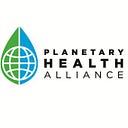Jacob Doku Tetteh Spotlights Rebecca Shaw
By Jacob Doku Tetteh, Travel Scholar and Speaker Ambassador at the 2019 Planetary Health Annual Meeting
At the 2019 Planetary Health Annual Meeting, we had the opportunity to hear a keynote message from Dr. Rebecca Shaw, who is currently the Vice President and Chief Scientist at the World Wildlife Fund (WWF). She holds an MA in Environmental Policy and a PhD in Energy and Resources from the University of California, Berkeley and completed her post-doc at Stanford University. Before joining WWF, Dr. Shaw worked with the Environmental Defense Fund, Nature Conservancy’s California Chapter, and the Carnegie Institution of Science’s Department of Global Ecology at Stanford University in various capacities. She was also a lead author of the Fifth Assessment of the Intergovernmental Panel on Climate Change Working Group II. WWF is a large conservation organization in about 100 countries working in the field and in policy arenas. Her role as Chief Scientist and Senior VP of WWF includes staying at the cutting-edge of environmental science and policy, and working with global collaborators to identify and advance key questions, challenges, projects, and solutions related to WWF’s conservation mission.
At the annual meeting, her talk, “Evolving Science and Policy to Meet the Challenge of Planetary Health,” highlighted how WWF’s work connects with human health at different scales. She discussed conservation science and emphasized that policy should recognize that nature’s health and human health are intertwined — a core facet of planetary health. The reduction in food supply, the loss of water, and the outbreak of diseases challenge human health, and these result from air, water, and land degradation and the enormous loss of biodiversity. Conservation seeks to protect life and property, and as a result, a good job has to be done in protecting the ecosystem — but this is not enough. Dr. Shaw also highlighted how ecosystem services — services obtained directly from nature and nature’s contribution to the people — are becoming more recognized in a broader way. Conservation links to the health and wellbeing of people, reducing the negative impacts of fire, the looming threat of climate change, and the decline of species.
Dr. Shaw cited various relevant policy efforts at both the national and multinational levels — including Sustainable Development Goal 13, the Paris Climate Accord, the Convention on Biological Diversity, the Aichi Forest 2010–2012, etc. — and opined that it might not be policy that’s lacking, but implementation. She also mentioned the “New Deal for Nature and People,” which has the vision of protecting and restoring nature by 2030 to the benefit of the people and the planet. By 2030, WWF is looking at providing food and water for the projected 9 billion people and maintaining the diversity of life, stable climate, and inclusive healthy communities.
Her mention of the degradation of planet earth, including water resources, ties into my research, which basically looks at the different uses of water or water consumption locally and how its quality affects human health. In many communities today in Ghana, there are issues of illegal mining activities, locally referred to as “galamsey,” which have resulted in the high pollution of our water. In 2017, the government of Ghana banned illegal mining activities; however, the ban on these illegal mining activities has not fully worked, because the activities that were deemed illegal also serve as a means of livelihood for these miners. Other issues include improper agricultural practices along bodies of water and sand mining, which also pose a threat to water quality.
Being touched by the kind of work Dr. Shaw does at WWF, my major takeaway from her speech was for me was to not think about failures, but instead to focus on opportunities in a systematic way while doing things in an equitable manner that improves the health of the Earth.
Watch the talk here.
Disclaimer: The views and opinions expressed in this article are those of the author and do not necessarily reflect the position of the Planetary Health Alliance or its members.
